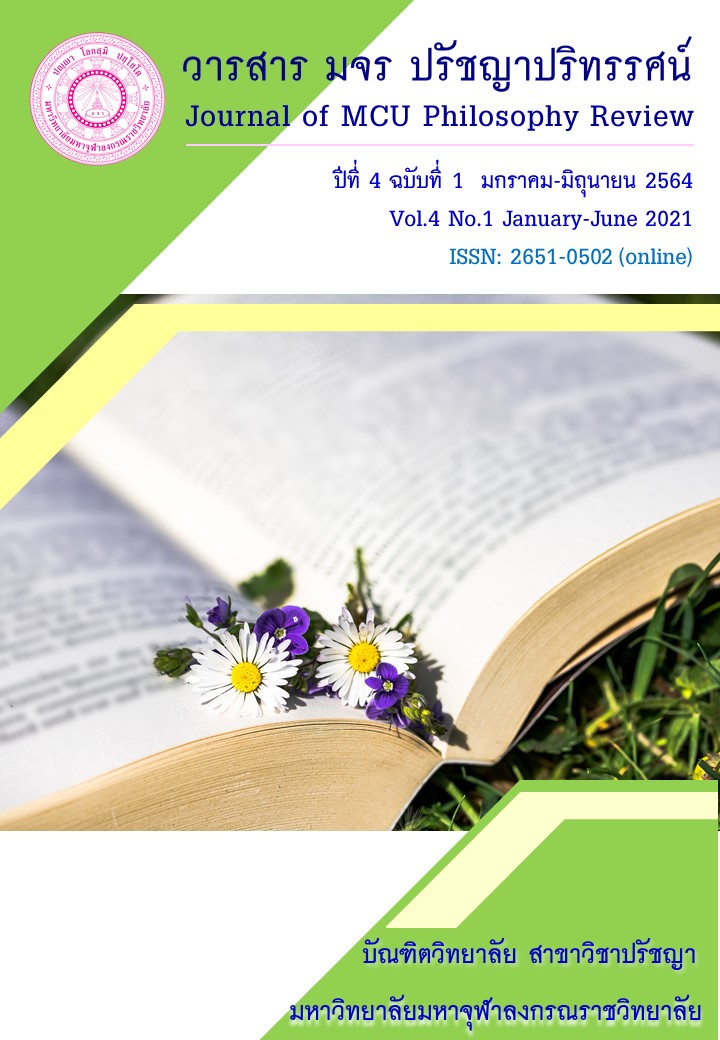A concept of a Righteous King (Dhammarãjã) in Theravada Buddhist philosophy and the solution of the political problems
Main Article Content
Abstract
In this research, three objectives were purposely made: 1) to study the concept of a Righteous King (Dhammarãjã) in Hindu Philosophy, 2) to study the concept of a Righteous King (Dhammarãjã) in Theravada Buddhist philosophy, and 3) to critically analyze the concept of a Righteous King (Dhammarãjã) in Theravada Buddhist philosophy. This research is documentary research.
According to the first objective, it was found that the key quality of a Righteous King in Hindu philosophy holds the caste of king (kshatriya) and thereby possessing the status quo of a righteous king to carry out the duty of caste of king or divine ruler. He rules the country under a belief in the power of God or deity. His political goal is to administer all the duties of their castes and to live together happily under the divine state or the theocracy. In the second objective, it was also found that the chief quality of being a righteous king in Buddhist philosophy is that everyone could be a righteous king whereby two necessary characteristics are needed: 1) the individual ethics, and 2) the social ethics which is governed through the fairness. The political goal of a righteous king is to make everyone physically, verbally and mentally happy in the good conditions under the rule of righteousness. In the third objective, as regards the concept of a righteous king in Buddhist philosophy, there are some characteristics which is similar to Hindu philosophy and the new aspects are put forward against the political concept of Hindu philosophy. The three essential aspects of disagreement are clearly shown that, on the one hand, the righteous king in Hindu philosophy is mainly based on the practice of Divine right where the ruling of the country is done under the theocracy and the Hindu ruler expands the state and political power by war, on the other hand, in Buddhist philosophy it argues that the righteous king ruler is virtuous or good man and thereby ruling the country through the righteous rules and thereby expanding the state and political power.
Article Details
บทความที่ได้รับการตีพิมพ์เป็นลิขสิทธิ์ของวารสาร มจร ปรัชญาปริทรรศน์
ข้อความในบทความที่ได้รับการตีพิมพ์ในวารสาร ถือเป็นความรับผิดชอบของผู้เขียนบทความ และข้อคิดเห็นนั้นไม่ถือว่าเป็นทัศนะและความรับผิดชอบของกองบรรณาธิการวารสาร มจร ปรัชญาปริทรรศน์
References
พระพรหมคุณาภรณ์ (ป.อ.ปยุตฺโต). (2548). รัฐศาสตร์และจริยธรรมนักการเมืองแนวพุทธ. มูลนิธิพุทธธรรม.
พระพรหมคุณาภรณ์ (ป.อ.ปยุตฺโต). (2552). จารึกอโศก รัฐศาสตร์แห่งธรรมาธิปไตย. สมุทรปราการ: สำนักพิมพ์ผลิธัมม์.
พระพรหมบัณฑิต (ประยูร ธมฺมจิตฺโต). (2557). ธรรมราชา. กรุงเทพฯ : โรงพิมพ์มหาจุฬาลงกรณราชวิทยาลัย.
มหาจุฬาลงกรณราชวิทยาลัย. (2539). พระไตรปิฎกฉบับภาษาไทย ฉบับมหาจุฬาลงกรณราชวิทยาลัย. กรุงเทพฯ : โรงพิมพ์มหาจุฬาลงกรณราชวิทยาลัย.
ส. ศิวรักษ์. (2551). คันฉ่องส่องพุทธธรรม. กรุงเทพฯ : สำนักพิมพ์ศึกษิตสยาม.
Deegalle, Mahinda. (2013). Visions of the Dharmarãjã: Conceptualizations of ‘Just Ruler’ in Theravada Buddhist Societies in South and Southeast Asia. KPI Congress XV Dharmarãjã. Bangkok: Charansanitwong Printing, 49-54.
Heinrich Zimmer. (1953). Philosophies of India. Edited by Joseph Campbell. U.S.A.: Routledge & Kegan Paul LTD.
Hemchandra Raychaudhuri. (1997). Political History of Ancient India. New Delhi: Oxford University Press.
Huston Smith. (2005). The Soul of Christianity: Restoring the Great Tradition. New York: Harper Collins.
Ian Harris, (Edited). (2007). Buddhism, Power and Political Order. New York: Routledge.
Keith J. Gomes. (2014). A Comparative Grammar of Just War: Contrasting Augustinian Christian and Vedic Hindu Worldviews. A thesis of doctor of Philosophy in Political Science. The Graduate and Postdoctoral Affairs: Carleton University Ottawa, Ontario.
Matthew J. Walton. (2012). Politics in the Moral Universe: Burmese Buddhist Political Thought. A dissertation for the degree of doctor of Philosophy. Department of Political Science: University of Washington


